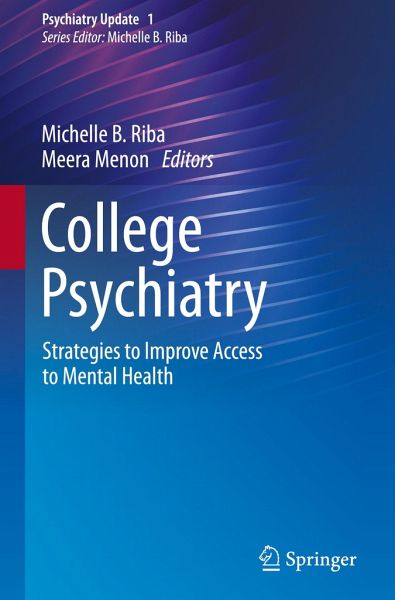
College Psychiatry
Strategies to Improve Access to Mental Health
Herausgegeben: Riba, Michelle B.; Menon, Meera

PAYBACK Punkte
53 °P sammeln!
This book explores the practical strategies outlined by national thought leaders to improve access to mental health care in the practice of college psychiatry. It addresses the escalating need for mental health services on college and university campuses.Concise yet comprehensive, the book considers the college experience for the increasingly diverse student body, including non-traditional college students, first-generation college students, and students with a history of mental illness. Beginning with a discussion on the current national health trends in college mental health, chapter one exp...
This book explores the practical strategies outlined by national thought leaders to improve access to mental health care in the practice of college psychiatry. It addresses the escalating need for mental health services on college and university campuses.
Concise yet comprehensive, the book considers the college experience for the increasingly diverse student body, including non-traditional college students, first-generation college students, and students with a history of mental illness. Beginning with a discussion on the current national health trends in college mental health, chapter one explores the current epidemiology of student mental health problems, the systemic challenges in recruitment, and funding psychiatric services. Subsequent chapters then delve into the various systems and models of psychiatric care for college students, including differing parental involvement levels and the importance of collaborative care to short term management and referral of students at risk. Chapters five and six examine mental health considerations for LGBTQ, Black, Indigenous, and People of Color students. Further chapters analyze the critical nature of successfully navigating a leave of absence, as well as the consideration of threat assessment on college campuses. The book closes with a highly relevant evaluation of telemental health and telepsychiatry in the College Setting as it pertains to the ongoing barriers to care caused by COVID-19.
Socially conscious and timely, College Psychiatry is an indispensable text for all mental health professionals.
Concise yet comprehensive, the book considers the college experience for the increasingly diverse student body, including non-traditional college students, first-generation college students, and students with a history of mental illness. Beginning with a discussion on the current national health trends in college mental health, chapter one explores the current epidemiology of student mental health problems, the systemic challenges in recruitment, and funding psychiatric services. Subsequent chapters then delve into the various systems and models of psychiatric care for college students, including differing parental involvement levels and the importance of collaborative care to short term management and referral of students at risk. Chapters five and six examine mental health considerations for LGBTQ, Black, Indigenous, and People of Color students. Further chapters analyze the critical nature of successfully navigating a leave of absence, as well as the consideration of threat assessment on college campuses. The book closes with a highly relevant evaluation of telemental health and telepsychiatry in the College Setting as it pertains to the ongoing barriers to care caused by COVID-19.
Socially conscious and timely, College Psychiatry is an indispensable text for all mental health professionals.












